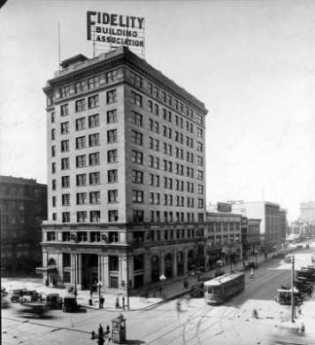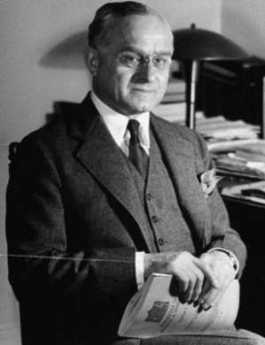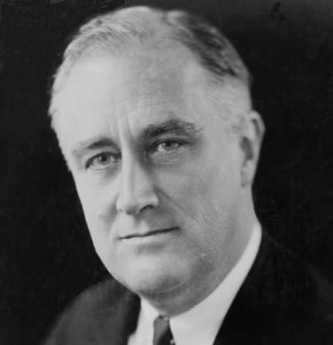Related Topics
Government Organization
Government Organization
Favorites - II
More favorites. Under construction.
Mister Roberts

|
| Fidelity Building |
The Fidelity Building on Broad Street, now bearing the name of a successor bank, has its own ZIP code. It houses bank offices in one of its two towers and a general office building in the other. The top floor, the 29th, was originally the executive suite of the bank, with executive dining rooms, and lesser dining rooms where big deals were dealt. As an economy move, the executive floor eventually became a mid-day luncheon club, and right now it houses the law library of Montgomery, McCracken, and Rhoads. It carries the name of the law firm's most famous partner, Associate Justice of the United States Supreme Court, Owen Roberts. In the center of the hushed library, a single volume sits on a table, held in place by two very heavy bookends. It's the bound 1955 volume of the University of Pennsylvania Law Review, with a small green tab attached where a hundred pages of testimonials to Roberts are found. The tabbed page itself begins an essay by Felix Frankfurter, written in prose so elegant it seems like poetry. His topic is the mind of Justice Roberts at the time he switched sides in the 1936 Roosevelt Supreme Court packing episode, the famous "switch in time, which saved Nine."
Frankfurter and Roberts sat on the Supreme Court together for years, but the events in question took place before Frankfurter was appointed. Like the rest of us he has to conjecture what was in Roberts' mind. Felix Frankfurter offers two pieces of special evidence, his long personal observation of Roberts' character, and a private memo. Roberts had written in the memo that he had been ready to switch for Roosevelt before the court-packing proposal was made, but held off taking the step for several months because Justice Harlan Stone was absent for medical reasons. Stone, later elevated by Roosevelt to Chief Justice, was known to favor Roosevelt's New Deal proposals, particularly the Minimum Wage, which were central to the Constitutional question: whether the federal government had a right to go beyond regulating interstate commerce, to regulating all commerce. Frankfurter concludes that Roberts did not make the switch in response to Roosevelt's threats, because he had already decided to act before the threat was made to enlarge the court until it contained a majority in favor. Not only had Roberts decided to switch before the Presidential threat was made, but he also proved to be a courageous and highly moral person throughout the later years when he and Frankfurter were closely associated.

|
| Frank Furter |
Unfortunately, Frankfurter's 1955 eulogy has not convinced historical opinion. After all, there were dozens of people on the inside of the Supreme Court and the Presidential Administration who knew Roberts better than Frankfurter did and probably talked about nothing else for weeks. Up until the fateful decision, almost all of Roberts' close friends had been on the other side of the issue and felt entitled to some sort of explanation if not an apology. Washington is simply crawling with reporters whose job it is to search out gossip and hearsay. When an opinion emerges from such a cauldron and survives for seventy years, it has substance. The prevailing view is that Roberts felt the Judicial Branch of government was in jeopardy, and that someone must sacrifice himself in the crisis. Roosevelt had just been re-elected in a landslide, the new Congress would surely do anything he asked, the nation was in the depths of a horrendous economic depression for which Roosevelt was proposing the only conceivable Keynsean solution of increasing national liquidity through government spending. Roberts knew he would become a political pariah, but his duty seemed clear to him. It is merely a matter of phrasing whether his position was described as knuckling under to Roosevelts's threats, or throwing his body over Roosevelt's hand grenade.
With seventy years of retrospect, it all seems so pitiful. Public opinion and congressional action was in fact outraged at

|
| Franklin Roosevelt |
Roosevelt, landslide or no landslide. Roberts and Stone had no need to do what Roosevelt asked. Any class in economics today can marshal a respectable argument against the wisdom of minimum wage laws, every class in law school is amazed and mostly appalled by their fresh reading of the Constitution's prohibition against Congress acting outside the limits of "commerce between the several states". On the level of governments rescuing their countries from depression by expanding liquidity, the experience has been that tax cuts usually succeed in that, while government spending usually does not. Paradoxically, the one principle to survive respectably from the 1936 political revolution was the movement toward national standards for internal trade and commerce, away from Balkanization. That's too big a step to take without public debate, perhaps, and highly disruptive if it's done in a single step. But the general idea is probably a sound one.
Poor Roberts probably never even considered that aspect. He was overwhelmed in his role as a Greek tragic hero, pursuing tragic inevitability.
Originally published: Wednesday, June 21, 2006; most-recently modified: Friday, May 24, 2019